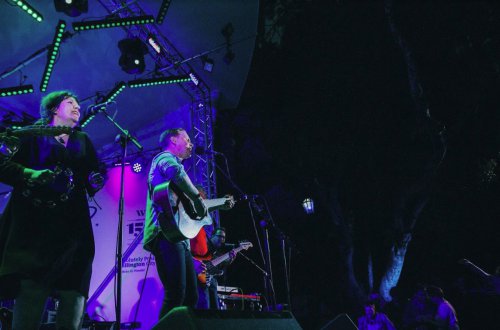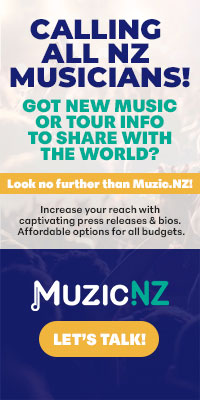Anxiety Club - Interview: Anxiety Club

Anxiety Club released their debut studio EP titled Black Heart in October 2018 and is about to embark on a three-date tour touching down in Auckland, Wellington, and Christchurch during March of this year. Kev (vocals, guitar) spoke to Jeremy from Muzic.net.nz:
What has been the overall reception of the Black Heart EP since its release, and has this helped inform your decisions in deciding your upcoming tour dates?
The response has been hugely positive, both in NZ and overseas, which is always gratifying. The dates were booked before we released the EP, but beyond NZ, we’re definitely looking at options based on where people are listening. One of our tracks has a big listenership in Denmark, so you just never know!
 Do you think the success of your upcoming shows will have an impact on touring more regional venues for Anxiety Club in the future?
Do you think the success of your upcoming shows will have an impact on touring more regional venues for Anxiety Club in the future?
Completely aside from these upcoming shows, we’d love to do more regional touring. We played Hastings, Gisborne and New Plymouth last year and had a blast. Hope to visit again soon.
The band’s music has been described as “feel-good anthems of heartbreak and despair”, “Wilco meets Radiohead”, and “Alternative Country”.
What are some of the specific musical influences that make up Anxiety Club, and how do you utilise these influences when writing songs and coming up with material as a band (or during your creative process)?
We all share a love of guitar music, but very different guitar music. For some in the band it’s folk and country, for others it’s rock and metal. This leads to a lot of fist fights and legal bills, but that’s just part of the ‘process’, right?
In terms of specific influences, we’re talking about David Bowie, Smashing Pumpkins, Wilco, Radiohead, Nick Cave, The Mutton Birds, most of the Flying Nun back catalogue. We’re not consciously trying to sound like anyone else, but the sound of bands we grew up with naturally infuses itself into the music we write.
 The single Ginger In The Summer was released this month and infers some deeper lyrical content beyond the initial feel-good nature of the track. Could you describe the context of the lyrics in relation to the conflict that is described within the song?
The single Ginger In The Summer was released this month and infers some deeper lyrical content beyond the initial feel-good nature of the track. Could you describe the context of the lyrics in relation to the conflict that is described within the song?
Good question! It’s a classic love song really, but there is a darker theme of someone sacrificing themselves and their ambitions, for someone else, for too long. That’s what’s happened to the female character. She gives up a lot to be with a ginger drummer who’s not prepared to give up anything for her. Bloody gingers eh? Can’t trust ‘em.
How did the name ‘Anxiety Club’ originate?
We began by going through band name generators on the Internet, and out of that the name was inspired. We wanted something tongue- in-cheek but not ridiculous. The name Anxiety Club just seemed to fit – and somehow seems appropriate for the times we live in.
Do you think there are any mental health issues that can be linked to or that are specifically relevant to individuals working within the music industry?
I think any artform that involves you putting yourself and your creations out there to be critiqued has the potential to bring up a whole range of mental health issues. And let’s be honest – it’s often mental health issues that inspire that creativity in the first place. Are there issues specific to the music industry? I’m not sure – you need to be resilient and have a thick skin, be willing to get vulnerable in front of a crowd of strangers; but that’s probably true of most art.
 As a band, do you see an increased level of touring as part of the future of Anxiety Club, and if so, how might you address some of the commonly experienced concerns associated with touring musicians (i.e. time spent away from family, staying healthy on the road, and stresses associated with travelling and performing)?
As a band, do you see an increased level of touring as part of the future of Anxiety Club, and if so, how might you address some of the commonly experienced concerns associated with touring musicians (i.e. time spent away from family, staying healthy on the road, and stresses associated with travelling and performing)?
I certainly hope so, though it’s unlikely to be the 24hrs in a van, dossing on a couch style. While in our minds we’re still teenagers, our bodies are not so receptive to that level of punishment these days.
I think the most important thing is for the band to become a sort of family. You need to be looking out for each other, and if someone’s having a rough time, you help them out. We also have to pace ourselves and restrict our Jack Daniels intake to one case a day each – which is tough, but not impossible.
The song Black Heart presents an open question regarding an internal struggle with one's own thoughts, impulses, and identity. This is expressed lyrically through the implication of a questioning relationship (and more emotionally through the use of specific imagery in the music video) Expanding on this, do you think the video accurately portrays the song as intended, or is there a deeper connotation that is being presented or eluded to in the video?
The idea behind the video was that the feelings in the song are universal, but also highly personal. In every relationship, no matter who or where you are, there are moments of doubt or jealousy and so on.
We wanted to make the video personal, to confront the viewer with a diverse range of individuals and emotions and find out what response that would stir in them.
 Streaming music has become the de facto listening experience for the majority of music listeners, replacing traditional radio with a more individually curated experience under the ever-growing subscription model.
Streaming music has become the de facto listening experience for the majority of music listeners, replacing traditional radio with a more individually curated experience under the ever-growing subscription model.
Do you think that accounting for individual plays is an accurate way of determining an artist’s success or credibility, and do you think streaming services have a justified place within the music business in regard to supporting musicians to create further content?
Oh man, that’s a hot topic at the moment – Spotify destroying music’s middle class and all that.
Streaming services absolutely have a place, and they’re fantastic for discovering new music. But the flipside of that is they’ve opened the floodgates, so it’s very hard to cut through and get heard. And only a tiny fraction of artists can make a living off streaming alone. Like anything new, it takes time to find the right balance and there’s a lot of work to be done to develop a sustainable model.
I actually think we’ll see, and we’re already seeing to some extent, musicians moving toward more of an old-school patronage model, where they become supported by fans or alternative revenue streams or, god forbid, hedge fund managers. It’ll become the only way to survive.
Do you think there is general knowledge about the level of skill involved in creating and recording music, and should artists and musicians be paid more accurately for the content they create?
No, I don’t think the level of skill is well understood at all, particularly the skill involved in making a great recording. And it’s likely to be less understood and less valued, as digital tools make it easier to automate sounds and instruments and create songs and pieces of music.
But equally, I don’t think you can get too precious about that. Music shouldn’t be an inaccessible or elitist thing.
You use the word ‘content’, which is interesting because I think that’s the perception of most music now. Having said that, the ability to create a truly great song is still rare, and not something that an algorithm can reproduce (yet).
I don’t know how you’d define ‘accurately’, in terms of compensation; it’s hard to put a monetary value on it. Music is only worth as much as it means to the listener. For decades, artists got paid for one great song and nine average ones. Now they only get paid for the great ones, and that’s a hard thing to get used to.
 Do you think there is still an importance for physical mediums and/or digital music as part of a tangible product in order to make a sustainable living as a musician (excluding live performance)?
Do you think there is still an importance for physical mediums and/or digital music as part of a tangible product in order to make a sustainable living as a musician (excluding live performance)?
Physical mediums are definitely still vital, and obviously make the musician more money. Nothing beats holding a tangible artefact in your hands. Just look at the resurgence of vinyl – and now cassettes are making a comeback. In fact, we’re so hipster that our next EP will only be released on wax cylinder!
What is the best way your audience can support Anxiety Club in continuing to release and play music for the long term?
Download the EP, come to our gigs, but above all – tell other people! The more you can help us spread the word and bring people to the music, the longer we’ll be in a position to do this.
With all the available platforms available for promotion online, where is the best place to stay up-to-update with Anxiety Club in the future?
Facebook or our mailing list – all our major updates are sent out. And who doesn’t need more email in their life?! ;-)
About Anxiety Club

They have toured their home country of New Zealand (inc. co-headlining shows with Miles Calder, Adam Hattaway, Milly Tabak & The Miltones), graced summer festival stages (incl. Coastella, Festival of Lights) and recorded a number of memorable live-to-airs for Radio NZ.
Like for many artists, the pandemic hit hard. Gigs and tours were put on hold and progress on the Francine follow-up slowed to a standstill. They lost band members to other cities during this time too - including founding drummer Chris Hill. What could have destroyed the band instead fuelled a surge of creativity in remaining members Kev Fitzsimons (Thom Cross) and Clint Meech (Matt Langley band). To help them complete their debut album they collaborated with Chris Armour (Miles Calder band) on guitars, Andrew Bain (Fur Patrol) on bass and LA-based beat-maker Zach Simao.
Visit the muzic.net.nz Profile for Anxiety Club
Releases
Other Interviews By J_Plates
 Zoe Jennings - Interview with ZÖ
Zoe Jennings - Interview with ZÖ
16 Apr 2019 // by J_Plates
ZÖ is a new artist who’s set to release a small collection of songs, in which she sings candidly about her experiences and struggles in a way that lets others be vulnerable. Jeremy from Muzic.
Read More...
 Interview with Sean Bodley
Interview with Sean Bodley
12 Apr 2019 // by J_Plates
Sean Bodley is a solo instrumental guitarist, and a former member of Tauranga act The Eternal Sea. Jeremy from Muzic.
Read More...
 Missrosevalentina - Interview with Hybrid Rose
Missrosevalentina - Interview with Hybrid Rose
05 Apr 2019 // by J_Plates
Wellington based Hybrid Rose's musical character showcases the embodiment of too much sugar, too much spice and a little bit of underground flamboyance. Jeremy from Muzic.
Read More...
Most Viewed Artists
Latest Galleries
NZ Top 10 Singles
- APT.
ROSÉ And Bruno Mars - DIE WITH A SMILE
Lady Gaga And Bruno Mars - BIRDS OF A FEATHER
Billie Eilish - TASTE
Sabrina Carpenter - I LOVE YOU, I'M SORRY
Gracie Abrams - ESPRESSO
Sabrina Carpenter - SAILOR SONG
Gigi Perez - LOSE CONTROL
Teddy Swims - A BAR SONG (TIPSY)
Shaboozey - GOOD LUCK, BABE!
Chappell Roan












 Report A Problem
Report A Problem

